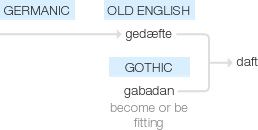Daft
Old English gedæfte ‘mild, meek’, of Germanic origin; related to Gothic gabadan ‘become or be fitting’.
wiktionary
From Middle English dafte, defte(“gentle; having good manners; humble, modest; awkward; dull; boorish”), from Old English dæfte(“accommodating; gentle, meek, mild”), [1], from Proto-West Germanic *daftī(“fitting, suitable”), ultimately from Proto-Indo-European *dʰh₂ebʰ-(“fitting; to fit together”). Related to Old English dafnian, dafenian(“to be fitting, appropriate, or becoming”), Russian до́брый(dóbryj, “good”).
Compare silly which originally meant “blessed; good, innocent; pitiful; weak”, but now means “laughable or amusing through foolishness or a foolish appearance; mentally simple, foolish”. [2]
Unrelated to, though perhaps influenced by, daff(“fool (n.); to be foolish (v.)”) (past form daffed).
etymonline
daft (adj.)
c. 1200, "mild, well-mannered," Old English gedæfte "gentle, becoming," from Proto-Germanic *gadaftjaz (source also of Old English daeftan "to put in order, arrange," gedafen "suitable;" Gothic gadaban "to be fit"), from *dab-, which has no certain IE etymology and is perhaps a substratum word.
Sense deteriorated to "dull, awkward, uncouth, boorish" (c. 1300), perhaps via the notion of "humble." Further evolution to "foolish, simple, stupid" (mid-15c.) and "crazy" (1530s) probably was influenced by analogy with daffe "halfwit, fool, idiot" (see daffy); the whole group probably has a common origin. For sense evolution, compare nice, silly. Related: Daftly; daftness.
